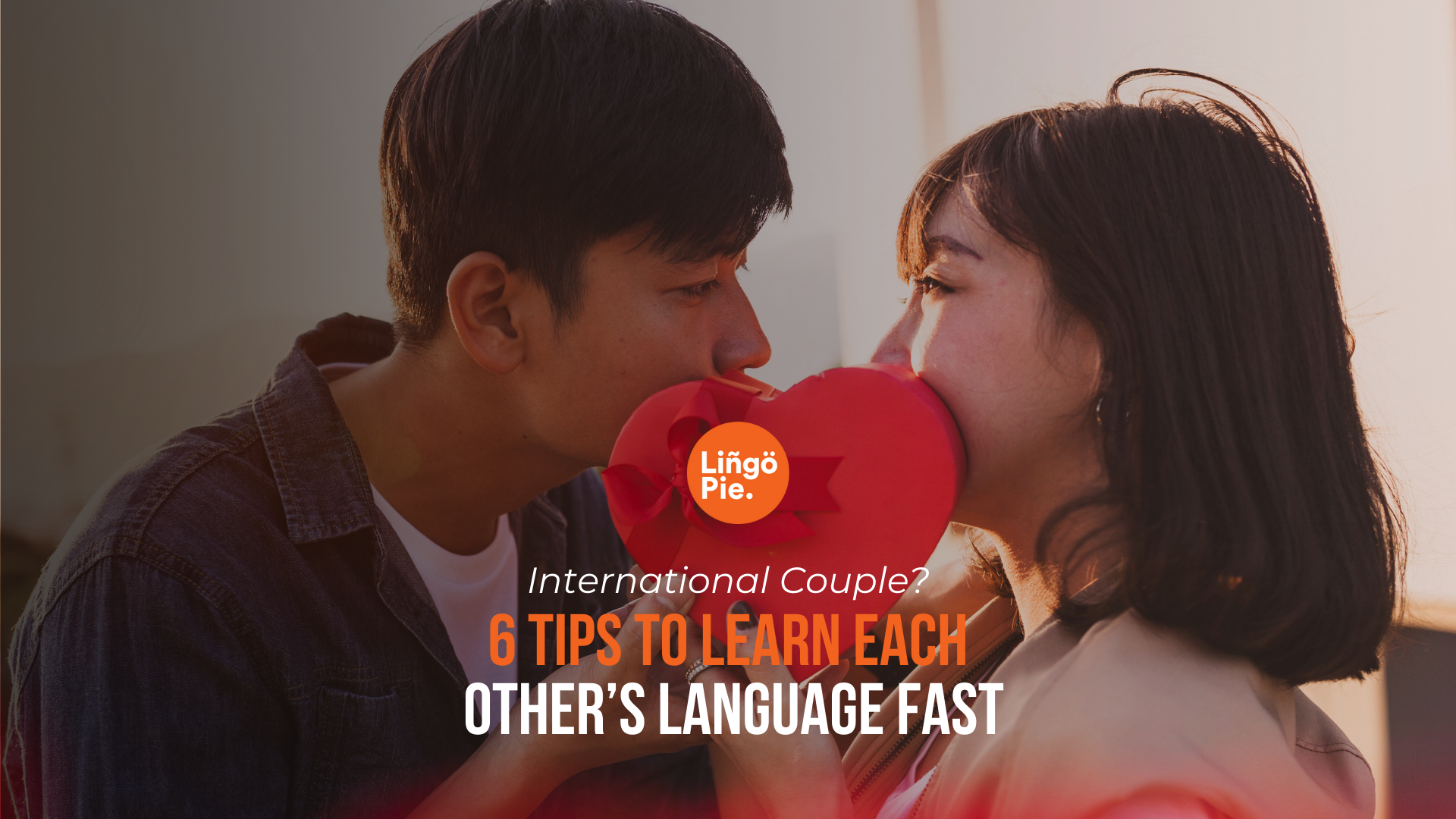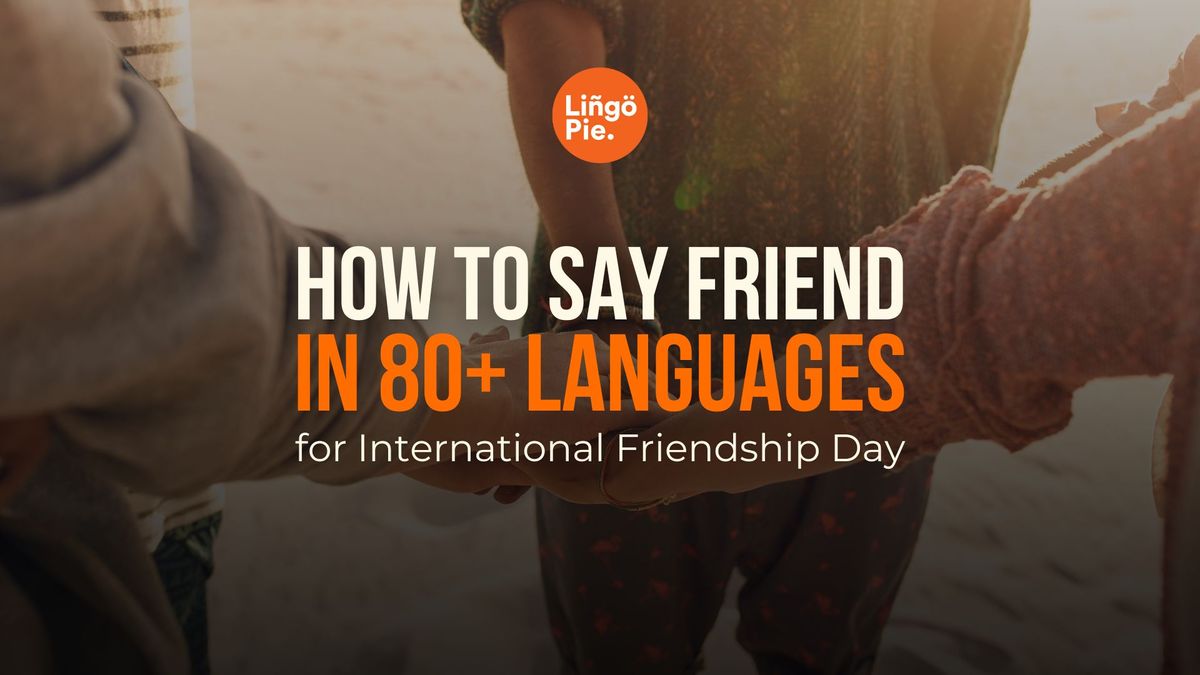Looking for a fun way to surprise your friends? Skip the usual "friend" and try "amigo," "صديق" (sadiq), or "친구" (chingu) instead. You see, learning to say "friend" in someone's native language may seem like a tiny detail, but it's one of those simple gestures that can light up someone's day and make any message feel personal.
In this guide, I’ve put together different ways to say friend in many languages. Whether you’re looking to make someone smile, show you care, or start a deeper conversation about their culture, these little words are guaranteed to help you build a more meaningful relationship!
- How To Do The Mexican Accent [Complete Guide]
- How To Become Fluent in Spanish: 5 Best Tips
- English or Spanish: 11 Surprising Differences

International Friendship Day 2025
International Friendship Day is a special day to celebrate the importance of friendship and its positive impact on our lives. It is about showing gratitude for your friends, strengthening old bonds, and making new ones.
The idea started in the early 20th century, but the United Nations officially declared July 30 International Friendship Day in 2011. Some countries, like India and parts of South America, celebrate it on the first Sunday of August instead.
People mark the day by exchanging friendship bands, cards, small gifts, or simple messages that remind friends how much they are appreciated. Many also use it as a chance to reach out to long-distance friends or plan a get-together.
How to Say 'Friend' in Many Languages
Friend In Western European Languages
Western European languages share deep Indo-European roots, which is why you'll notice similarities in how they express friendship. Many of these words come from ancient terms for "love" and "freedom,” reflecting how friendship was historically tied to concepts of chosen family and voluntary bonds.
- French: ami (m), amie (f)
- Spanish: amigo (m), amiga (f)
- Portuguese: amigo (m), amiga (f)
- Italian: amico (m), amica (f)
- German: Freund (m), Freundin (f)
- Dutch: vriend (m), vriendin (f)
- Swedish: vän
- Norwegian: venn
- Danish: ven
- Finnish: ystävä
- Icelandic: vinur (m), vinkona (f)
- Catalan: amic (m), amiga (f)
- Galician: amigo (m), amiga (f)
- Irish: cara
- Scottish Gaelic: caraid
- Welsh: ffrind
- Basque: lagun
- Luxembourgish: Frënd
- Frisian: freon
- Romansh: ami
Beyond the formal terms, Western European languages have a rich variety of casual words for friends. In British English, "mate" is your go-to, while French speakers often use "pote" or "copain/copine" in casual settings. Spanish speakers switch it up by region - you'll hear "cuate" in Mexico, "tío/tía" in Spain, and "compa" pretty much everywhere.
On the other hand, Germans love using "Kumpel" or "Digga" with close friends, while Italians might throw in "fratello" (literally "brother") or "vecchio" ("old one") when chatting with buddies.

Friend In Eastern European Languages
Eastern European languages, particularly Slavic ones, have a distinct way of expressing friendship that often involves multiple terms based on closeness. Many of these languages make clear distinctions between casual friends, close friends, and best friends – showing how these cultures value different levels of friendship.
- Russian: друг (drug) (m), подруга (podruga) (f)
- Polish: przyjaciel (m), przyjaciółka (f)
- Ukrainian: друг (druh) (m), подруга (podruha) (f)
- Czech: přítel (m), přítelkyně (f)
- Slovak: priateľ (m), priateľka (f)
- Bulgarian: приятел (priyatel) (m), приятелка (priyatelka) (f)
- Croatian: prijatelj (m), prijateljica (f)
- Serbian: пријатељ (prijatelj) (m), пријатељица (prijateljica) (f)
- Slovenian: prijatelj (m), prijateljica (f)
- Macedonian: пријател (prijatel)
- Romanian: prieten (m), prietenă (f)
- Hungarian: barát (m), barátnő (f)
- Albanian: mik (m), mike (f)
- Lithuanian: draugas (m), draugė (f)
- Latvian: draugs (m), draudzene (f)
- Estonian: sõber
- Belarusian: сябар (syabar) (m), сяброўка (syabroŭka) (f)
- Moldovan: prieten (m), prietenă (f)
- Armenian: ընկեր (ynker)
- Georgian: მეგობარი (megobari)
Slavic languages can also get pretty creative with friendship terms. Russians casually use "братан" (bratan) or "кореш" (koresh) among close friends, similar to "bro" or "buddy" in English. Polish friends often call each other "kumpel" or "ziom" (like saying "homie"), while Ukrainians use "друзяка" (druziaka) for that extra friendly touch. In Czech, "kámoš" is the go-to casual term that everyone uses.

Friend In Asian Languages
Asian languages often encode social relationships directly into their friendship terms. Age, social status, and relationship depth all influence which word for "friend" you should use. In Japanese and Korean, for example, there are specific terms for school friends, work friends, and childhood friends.
- Mandarin Chinese: 朋友 (péngyou)
- Japanese: 友達 (tomodachi)
- Korean: 친구 (chingu)
- Vietnamese: bạn
- Thai: เพื่อน (pheuan)
- Hindi: दोस्त (dost), मित्र (mitra)
- Urdu: دوست (dost)
- Bengali: বন্ধু (bondhu)
- Telugu: స్నేహితుడు (snehitudu) (m), స్నేహితురాలు (snehituralu) (f)
- Tamil: நண்பன் (nanban) (m), நண்பி (nanbi) (f)
- Kannada: ಗೆಳೆಯ (geleya) (m), ಗೆಳೆತಿ (geleti) (f)
- Malayalam: സുഹൃത്ത് (suhruthu)
- Marathi: मित्र (mitra)
- Gujarati: મિત્ર (mitra)
- Punjabi: ਦੋਸਤ (dost)
- Indonesian: teman
- Malay: kawan
- Tagalog: kaibigan
- Khmer: មិត្ត (mit)
- Lao: ໝູ່ (mou)
Asian languages balance casual terms with respect. In Mandarin, close friends are often called "哥们" (gēmen) or "铁哥们" (tiě gēmen) for really tight friendships. Japanese friends shorten "tomodachi" to just "tomo" when keeping it casual, while Koreans might use "베프" (bepeu) - their version of "BFF".

Friend In Middle Eastern & North African Languages
In Middle Eastern and North African languages, words for "friend" often overlap with terms for brothers and close family members. This linguistic feature reflects these cultures' emphasis on treating friends as family and the deep social bonds friendship represents.
- Arabic (MSA): صديق (sadiq) (m), صديقة (sadiqa) (f)
- Persian: دوست (dust)
- Turkish: arkadaş
- Hebrew: חבר (chaver) (m), חברה (chavera) (f)
- Kurdish: هاوڕێ (hawrē)
- Egyptian Arabic: صاحب (sahib) (m), صاحبة (sahba) (f)
- Moroccan Arabic: صاحب (sahib) (m), صاحبة (sahba) (f)
- Levantine Arabic: رفيق (rafiq) (m), رفيقة (rafiqa) (f)
- Gulf Arabic: ربع (rabe') (m), ربيعة (rabi'a) (f)
- Azerbaijani: dost
- Pashto: ملګری (malgary)
- Dari: دوست (dost)
- Uzbek: do'st
- Tajik: дӯст (düst)
- Turkmen: dost
- Kazakh: дос (dos)
- Kyrgyz: дос (dos)
- Armenian: ընկեր (ynker)
- Georgian: მეგობარი (megobari)
- Maltese: ħabib
In these regions, friendship terms often overlap with family and terms of endearment. Arabic speakers frequently use "حبيبي" (habibi) among friends, despite it literally meaning "my love." In Egyptian Arabic, "صاحبي" (sa7bi) is super common, while Turkish friends often call each other "kanka" or "hacı".

Friend In African Languages
African languages reflect the continent's communal values in their friendship terms. Many languages here have words that blur the line between friend, neighbor, and community member – showing how friendship extends beyond individual relationships into broader social networks.
- Swahili: rafiki
- Amharic: ጓደኛ (gwadegna)
- Yoruba: ọ̀rẹ́
- Igbo: enyi
- Hausa: aboki
- Zulu: umngani
- Xhosa: umhlobo
- Afrikaans: vriend
- Somali: saaxiib
- Oromo: hiriyaa
- Kikuyu: mũrata
- Twi: adamfo
- Wolof: xarit
- Malagasy: namana
- Lingala: moninga
- Shona: shamwari
- Tigrinya: ዓርኪ (arki)
- Fulani: yiɗo
- Ndebele: umngane
- Sotho: motswalle
African urban language has evolved to include some really interesting friendship terms. Swahili speakers often use "mshikaji" in casual settings, while Nigerian Pidgin speakers might call close friends "paddy" or "chairman". In South Africa, "bra" or "bru" (from "brother") is super common among friends.
Fun Ways to Use These Words in Real Life
Knowing how to say “friend” in different languages is just the beginning. Make it meaningful by weaving these words into everyday chats, texts, or social posts. Try calling your friend amigo or rafiki instead of the usual “buddy.” Surprise a close friend with a note saying “Merci, mon ami !” or “Domo arigato, tomodachi !”
Here are some easy ideas to put these new words into practice:
• Write a short message or card using the word for “friend” in their language
• Add it to a birthday wish or a thank-you note
• Use it in a caption if you post a photo together
• Greet your friend with it when you see them in person
• Start a small conversation about what “friend” means in their culture
Little gestures like these show you care enough to learn a word that matters to them. It makes your bond feel even more special, and it might inspire you both to learn more about each other’s languages too.
Ready to Learn More Than Just "Friend"?
There you have it - over 80 ways to say "friend" across the world's languages! While learning these words is a great start, why stop there?
If you're curious about diving deeper into any of these languages, Lingopie's features make the journey fun and natural. Through popular TV shows and movies in your target language, you'll learn not just how to say "friend," but also pick up those casual, everyday expressions that make you sound like a local.
Speaking of which, did you know that many of the slang terms for "friend" we've covered actually pop up frequently in TV shows? On Lingopie, you'll hear how native speakers really use these words in context - from Spanish telenovelas and Korean dramas to French comedies.
Start your language learning journey with Lingopie's free trial today.











